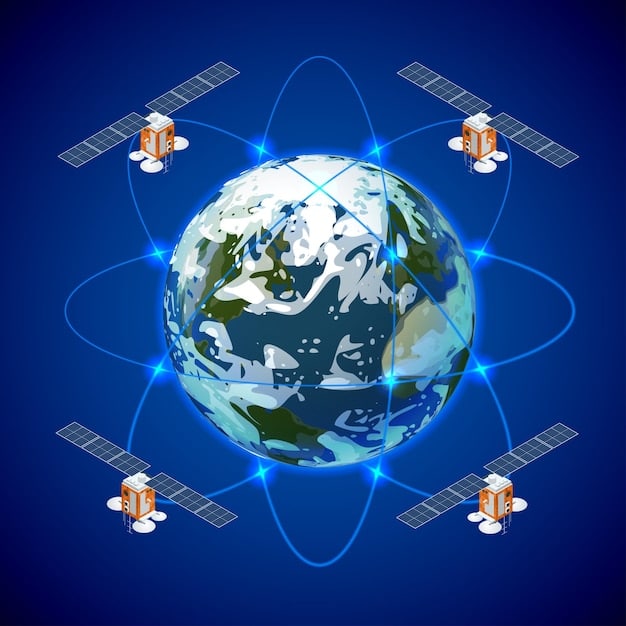The Geopolitical Implications of Space Militarization for the US

The geopolitical implications of space militarization for the US involve strategic competition, technological advancements, redefined security paradigms, and economic considerations, impacting international relations and national defense strategies.
The increasing militarization of space presents complex challenges and opportunities for the US, reshaping its geopolitical strategies and international relations. Understanding the geopolitical implications of space militarization for the US is crucial for navigating the evolving dynamics of global power and security.
The Evolving Landscape of Space Militarization
Space, once considered a realm of peaceful scientific exploration, is now increasingly becoming a domain for military operations. This shift has profound implications for global geopolitics, particularly for the United States, which has long been a dominant player in space technology and strategy.
The militarization of space involves the development and deployment of space-based assets for military purposes, including communication, surveillance, navigation, and even offensive capabilities. As other nations develop their own space capabilities, the US faces new challenges to its dominance and must adapt its strategies accordingly.

Strategic Competition in Outer Space
The militarization of space has intensified strategic competition among major powers, with the US, China, and Russia at the forefront. This competition extends beyond traditional terrestrial domains and encompasses the development of anti-satellite (ASAT) weapons and other technologies designed to disrupt or destroy space-based assets.
The US faces the challenge of maintaining its strategic advantage in space while also promoting international norms and agreements to prevent an arms race. This requires a multi-faceted approach that includes investing in advanced technologies, strengthening alliances, and engaging in diplomatic efforts to establish rules of the road for space activities.
The Role of Anti-Satellite Weapons
Anti-satellite weapons pose a significant threat to space-based assets, potentially disrupting critical communication, navigation, and surveillance systems. The development and testing of these weapons have raised concerns about the potential for escalation and the long-term consequences for the space environment.
Balancing Deterrence and Cooperation
The US must strike a balance between deterring potential adversaries and promoting cooperation in space. This requires developing credible defensive capabilities while also engaging in dialogue and negotiations to establish norms of behavior and prevent an arms race. The long-term stability of space depends on the ability of major powers to find common ground and avoid actions that could jeopardize the space environment.
- Developing advanced defensive capabilities to protect critical space assets.
- Strengthening alliances with like-minded nations to promote collective security in space.
- Engaging in diplomatic efforts to establish norms of behavior and prevent an arms race.
- Investing in research and development to maintain a technological advantage in space.
In conclusion, as strategic competition continues to intensify, the United States has to navigate these challenges thoughtfully, promoting both its own security interests and the long-term stability of the space environment.
Technological Advancements and Space Capabilities
Technological advancements are driving the militarization of space, with new capabilities emerging that could transform the nature of warfare. These advancements include the development of advanced satellite systems, autonomous spacecraft, and directed energy weapons that can be deployed in space.
The US is investing heavily in these technologies to maintain its competitive edge in space and ensure its ability to protect its space-based assets. However, these investments must be balanced with efforts to promote responsible behavior in space and prevent the proliferation of destabilizing technologies.

The Development of Advanced Satellite Systems
Advanced satellite systems are becoming increasingly sophisticated, with improved sensors, communication capabilities, and on-board processing power. These systems can provide real-time intelligence, enhance situational awareness, and support military operations in a variety of environments.
The Impact of Autonomous Spacecraft
Autonomous spacecraft are capable of operating independently without human intervention, allowing them to perform a wide range of tasks, including surveillance, reconnaissance, and even defensive operations. These spacecraft can be deployed in remote or contested areas, providing a persistent presence and enhancing mission effectiveness.
In summary, technological advancements can provide enhanced capabilities, the ethical and geostrategic considerations relating to their implementation must not be overlooked.
Redefining National Security Paradigms
The militarization of space is forcing the US to redefine its national security paradigms and adapt to the evolving threat landscape. This requires a comprehensive approach that integrates space capabilities into all aspects of military planning and operations, from strategic deterrence to crisis response.
The US must also develop new doctrines and strategies for defending its space-based assets against attack, including both kinetic and non-kinetic threats. This requires close coordination between the military, intelligence community, and private sector to ensure a robust and resilient space architecture.
The Importance of Space Domain Awareness
Space domain awareness is critical for understanding the threats and challenges facing the US in space. This involves collecting and analyzing data on space objects, monitoring potential threats, and assessing the vulnerabilities of US space-based assets. Effective space domain awareness is essential for making informed decisions and taking timely action to protect US interests in space.
Integrating Space Capabilities into Military Operations
The US must integrate space capabilities into all aspects of military planning and operations to maximize their effectiveness. This includes using space-based assets for communication, navigation, surveillance, and targeting, as well as developing new strategies and tactics for using space in support of terrestrial operations. The integration of space capabilities can provide a significant advantage in modern warfare, enhancing situational awareness, improving command and control, and increasing the precision and effectiveness of military operations.
- Investing in space domain awareness to improve understanding of the space environment.
- Developing new doctrines and strategies for defending space-based assets.
- Integrating space capabilities into all aspects of military planning and operations.
Ultimately, redefined security paradigms are essential for adapting to the growing recognition of space as a military domain.
Economic Considerations and the Space Industry
The militarization of space has significant economic implications for the US, both in terms of government spending and the growth of the commercial space industry. The US government is investing billions of dollars in space-based military programs, creating jobs and stimulating innovation across a range of industries.
The commercial space industry is also playing an increasingly important role in the militarization of space, providing advanced technologies and services to the military. This includes the development of commercial satellite systems, launch services, and space-based data analytics. The growth of the commercial space industry is creating new opportunities for economic growth and innovation, but also raises questions about the role of private companies in national security.
The Role of Commercial Space Companies
Commercial space companies are playing an increasingly important role in the militarization of space, providing advanced technologies and services to the military. This includes the development of commercial satellite systems, launch services, and space-based data analytics. The involvement of commercial companies can bring new capabilities and efficiencies to the military, but also raises concerns about the potential for conflicts of interest and the need for effective oversight.
Balancing Military and Commercial Interests
The US must strike a balance between military and commercial interests in space to ensure that both sectors thrive. This requires establishing clear rules and regulations for commercial space activities, promoting fair competition, and protecting national security interests. The long-term health of the US space industry depends on the ability to balance these competing interests and create a sustainable environment for innovation and growth.
In effect, the U.S. must leverage these economic factors to promote both national security and industrial development within space.
International Law and Space Governance
The militarization of space raises complex questions about international law and space governance. The existing legal framework for space activities, including the Outer Space Treaty of 1967, does not explicitly prohibit the militarization of space, but it does prohibit the placement of weapons of mass destruction in orbit. These outdated legal assumptions need a refresh to deal with the current challenges in space governance.
The US is working with other nations to develop new norms and agreements to govern military activities in space, including rules of the road for avoiding collisions, preventing the spread of debris, and ensuring the safety and security of space operations. These efforts are essential for maintaining a stable and sustainable space environment and preventing an arms race in space.
The Need for New Norms and Agreements
The existing legal framework for space activities is inadequate to address the challenges posed by the militarization of space. The development of new norms and agreements is essential for establishing clear rules of behavior, preventing conflicts, and ensuring the long-term sustainability of space activities.
Promoting Responsible Behavior in Space
The US must take a leadership role in promoting responsible behavior in space, including transparency, information sharing, and adherence to international norms. This requires working with other nations to develop common standards for space activities and holding states accountable for any violations of international law. Promoting responsible behavior in space is essential for maintaining a stable and secure space environment and preserving the benefits of space for future generations.
- Developing new norms and agreements to govern military activities in space.
- Promoting transparency and information sharing to build trust and prevent misunderstandings.
- Enforcing international law and holding states accountable for violations.
In light of this, the US is in a critical position to promote responsible behavior and ensure the long-term sustainability of space ventures.
Geopolitical Implications for US Alliances
The militarization of space has significant implications for US alliances, requiring close coordination with allies on space security issues. The US is working with its allies to develop joint strategies for defending space-based assets, sharing intelligence, and conducting joint military operations in space. These partnerships are essential for maintaining a collective security posture and deterring potential adversaries from attacking space-based assets.
The US must also address the concerns of its allies about the potential for an arms race in space and the impact of military activities on the space environment. This requires transparency, consultation, and a commitment to responsible behavior in space. By working closely with its allies, the US can strengthen its alliances and promote a more stable and secure space environment.
Strengthening Alliances Through Space Cooperation
Space cooperation can be a powerful tool for strengthening alliances and building trust among nations. The US is working with its allies to develop joint space programs, share technology and expertise, and conduct joint research and development. These collaborations can enhance the capabilities of all participating nations and promote a shared understanding of the challenges and opportunities in space.
Addressing Allies’ Concerns
The US must be sensitive to the concerns of its allies about the potential for an arms race in space and the impact of military activities on the space environment. This requires transparency, consultation, and a commitment to responsible behavior in space. By addressing these concerns proactively, the US can maintain the support of its allies and promote a more unified approach to space security.
In considering these factors, the way the US handles collaborations and addresses concerns shapes the strength and unity of its international alliances.
| Key Point | Brief Description |
|---|---|
| 🚀 Strategic Competition | US faces challenges from China and Russia in space. |
| 🛰️ Tech Advancements | New capabilities like advanced satellites transform warfare. |
| 🛡️ Security Paradigms | Redefining defense strategies to integrate space assets. |
| 🤝 US Alliances | Cooperation with allies is crucial for space security. |
FAQ
▼
Space militarization involves developing and deploying space-based assets for military purposes, including communication, surveillance, and potential offensive capabilities. It signifies the increasing importance of space in national security strategies.
▼
It poses a challenge to US dominance in space, creates new security threats, and necessitates the development of defensive strategies. Additionally, it has economic and political implications for the US.
▼
ASAT (Anti-Satellite) weapons can disrupt or destroy space-based assets. Their development raises concerns about escalation and the long-term consequences for the space environment, affecting global communication and navigation systems.
▼
Commercial space companies provide services to the military, developing commercial satellite systems and offering space-based data analytics. This can lead to innovations but raises questions about conflicts of interest.
▼
The US promotes transparency, information sharing, and adherence to international standards. Working with other countries improves standards, prevents conflicts, and guarantees the safety and security of operations.
Conclusion
In conclusion, the geopolitical implications of space militarization for the US are extensive and multifaceted, encompassing strategic competition, technological innovation, redefined security paradigms, economic considerations, international law, and alliance management. As space becomes an increasingly contested domain, it will necessitate both the U.S., and its allies, to adapt to the emerging challenges and opportunities so that they preserve their interests and contribute to the long-term stability and security of the space environment.





